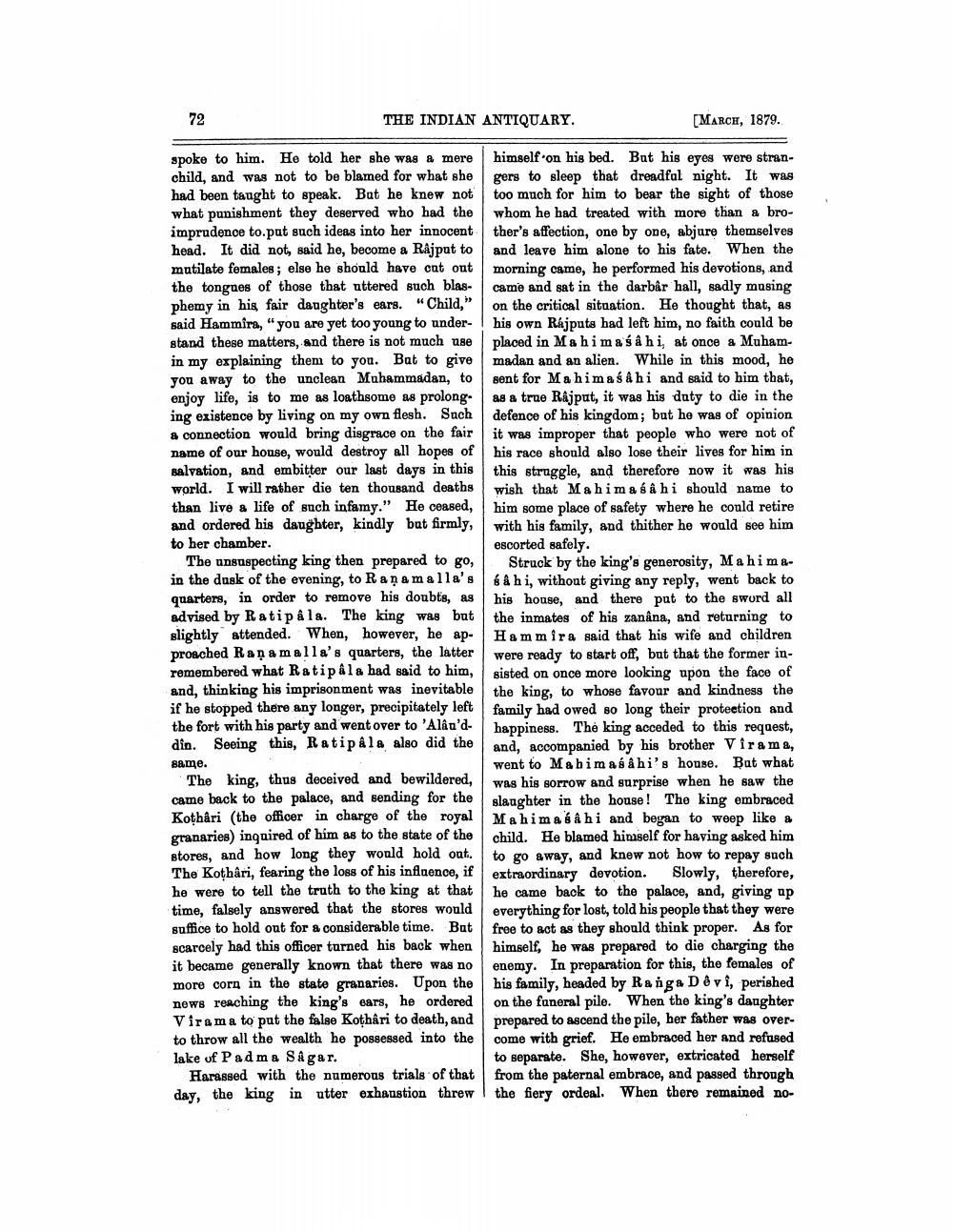________________
72
THE INDIAN ANTIQUARY.
spoke to him. He told her she was a mere child, and was not to be blamed for what she had been taught to speak. But he knew not what punishment they deserved who had the imprudence to put such ideas into her innocent head. It did not, said he, become a Rajput to mutilate females; else he should have cut out the tongues of those that uttered such blasphemy in his fair daughter's ears. "Child," said Hammira, "you are yet too young to understand these matters, and there is not much use in my explaining them to you. But to give you away to the unclean Muhammadan, to enjoy life, is to me as loathsome as prolong ing existence by living on my own flesh. Such a connection would bring disgrace on the fair name of our house, would destroy all hopes of salvation, and embitter our last days in this world. I will rather die ten thousand deaths than live a life of such infamy." He ceased, and ordered his daughter, kindly but firmly, to her chamber.
The unsuspecting king then prepared to go, in the dusk of the evening, to Ranamalla's quarters, in order to remove his doubts, as advised by Rati pâla. The king was but slightly attended. When, however, he approached Ran a malla's quarters, the latter remembered what Ratipâla had said to him, and, thinking his imprisonment was inevitable if he stopped there any longer, precipitately left the fort with his party and went over to 'Alâu'd din. Seeing this, Ratipala also did the
same.
The king, thus deceived and bewildered, came back to the palace, and sending for the Kothari (the officer in charge of the royal granaries) inquired of him as to the state of the stores, and how long they would hold out. The Kothari, fearing the loss of his influence, if he were to tell the truth to the king at that time, falsely answered that the stores would suffice to hold out for a considerable time. But scarcely had this officer turned his back when it became generally known that there was no more corn in the state granaries. Upon the news reaching the king's ears, he ordered Virama to put the false Kothâri to death, and to throw all the wealth he possessed into the lake of Padma Sagar.
Harassed with the numerous trials of that day, the king in utter exhaustion threw
[MARCH, 1879.
himself on his bed. But his eyes were strangers to sleep that dreadful night. It was too much for him to bear the sight of those whom he had treated with more than a brother's affection, one by one, abjure themselves and leave him alone to his fate. When the morning came, he performed his devotions, and came and sat in the darbâr hall, sadly musing on the critical situation. He thought that, as his own Rajputs had left him, no faith could be placed in Mahi maśâhi, at once a Muhammadan and an alien. While in this mood, he sent for Mahima s & hi and said to him that, as a true Rajput, it was his duty to die in the defence of his kingdom; but he was of opinion it was improper that people who were not of his race should also lose their lives for him in this struggle, and therefore now it was his wish that Mahima śâhi should name to him some place of safety where he could retire with his family, and thither he would see him escorted safely.
Struck by the king's generosity, Mahima& hi, without giving any reply, went back to his house, and there put to the sword all the inmates of his zanâna, and returning to Hammira said that his wife and children were ready to start off, but that the former insisted on once more looking upon the face of the king, to whose favour and kindness the family had owed so long their protection and happiness. The king acceded to this request, and, accompanied by his brother Virama, went to Mahimasâhi's house. But what was his sorrow and surprise when he saw the slaughter in the house! The king embraced Mahima sahi and began to weep like a child. He blamed himself for having asked him to go away, and knew not how to repay such extraordinary devotion. Slowly, therefore, he came back to the palace, and, giving up everything for lost, told his people that they were free to act as they should think proper. As for himself, he was prepared to die charging the enemy. In preparation for this, the females of his family, headed by Ranga Devi, perished on the funeral pile. When the king's daughter prepared to ascend the pile, her father was overcome with grief. He embraced her and refused to separate. She, however, extricated herself from the paternal embrace, and passed through the fiery ordeal. When there remained no




